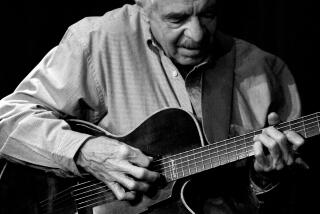WOODLAND HILLS : Jazzy Memorial for Joe Pass, Guitar Giant
- Share via
More than 100 friends, family and jazz heavy-hitters remembered legendary guitarist Joe Pass on Thursday as a warm, fun-loving man whose virtuosic technique will be copied by generations of jazz musicians.
Whether “singing in Italian restaurants or telling bad jokes,” eulogized his son, Joe Jr., Pass felt at home on stage, where, as a guitarist, “he sent forth a flurry of emotion. He played from his heart and nothing else.”
Guitarists Al Viola, Lee Ritenour, Phil Upchurch and others lined up at St. Mel’s Catholic Church in Woodland Hills to pay final respects to Pass, a creative soloist and accompanist to such greats as Frank Sinatra, Ella Fitzgerald and Sarah Vaughan.
The gathering was a chance for old friends and stage partners to meet, many often reaching across pews to shake hands or squeeze each other’s shoulders during the service.
Before the service, guitarist Joe Pisano and accordion player Tommy Gumina stood around reliving performances and studio sessions with Pass.
“He’d start to play a tune,” Pisano said, “and then he’d stop everything and say, ‘No, I hate this one,’ and everybody would crack up.”
“Yeah, Joe,” said Gumina, “‘I don’t think there’ll be another one like him.”
“They’re going to be playing his licks long after we’re gone,” Pisano said.
Pass died of cancer Monday at 65, after a career in which he recorded about 20 albums of his own and played on about 50 others. He gained international acclaim for his 1973 album “Virtuoso,” which included his interpretations of the standards “Stella by Starlight” and “Cherokee.”
After spending his teen-age years working in New York jazz clubs with bands headed by notables Tony Pastor and Charlie Barnet, Pass suffered from, and finally kicked, a drug habit. He worked with jazz legends Count Basie, Duke Ellington and Dizzy Gillespie.
Services for Pass, who lived in Woodland Hills for the past several years, included classical guitar performances along with the traditional “Ave Maria.”
More to Read
The biggest entertainment stories
Get our big stories about Hollywood, film, television, music, arts, culture and more right in your inbox as soon as they publish.
You may occasionally receive promotional content from the Los Angeles Times.









